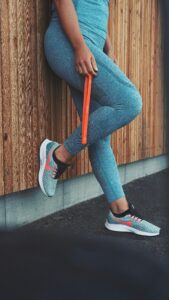By Jackie Warehime & Kasi Martin
Most winter gear is built for the cold but not for the climate—fossil fuel-based fabrics, toxic waterproofing like the GORE-TEX in George’s infamous over-puffed puffer, and short-lived trends are to blame. Good winter gear is non-negotiable, but staying warm shouldn’t come at the planet’s expense…especially if you’re out trekking it!
The upside? We’re breaking down the issues with winter gear and profiling the brands offering more intentionally made goods in layman’s terms, so you can stay warm, stylish, and sustainable without having to sweat your cool weather investment. That said, this guide is not marching orders to cast off all your winter gear if it still works. Unless you are concerned about a health risk or have adverse skin reactions, we advise maintaining and caring for the winter gear that still serves you. Consumerism has a stronghold on our culture and breaking it through intentional decision-making is how we release its grip.
That said, if you’re in need of new gear, we hope you’ll explore this list instead of Google or your algo and opt to invest in pieces that are built to last.
Sustainability Guidelines for Winter Gear
What to Watch For:
- Virgin Fossil Fuel-Based Synthetics: Virgin polyester, acrylics, and conventional synthetic fleece dominate winter gear because they’re cheap and easy to mass-produce. This wasn’t always the case. In the 50s and 60s, major chemical companies like DuPont and ICI (backed by fossil fuel giants) marketed polyester as a cheap, durable alternative to natural fibers like cotton and wool. Synthetics cut costs and increased production speed. Combined with the marketing prowess of brands, this gave rise to fast fashion. And, unfortunately, synthetics have sidelined innovation in natural textiles. Today, that means we’re stuck, not only with energy-intensive textiles, but ones that also harm our health.
- PFAS & “Forever Chemicals”: Many waterproofed fabrics use “forever chemicals” that won’t break down in the environment for over a thousand years. They’re also are linked with health risks, including higher rates of cancer, hormone, and fertility issues. These have gained international attention, especially as they pertain to water pollution, and many countries and states are rolling out new legislation to regulate and ban the use of PFAS. See our note at the end of this post for more details.
- Problematic Animal Products:
- Down feathers: These fluffy feathers that fill your puffer jacket come from ducks and geese. Though they’re naturally biodegradable and usually a byproduct of the meat industry, these feathers are sometimes inhumanely live-plucked from the birds. Certifications like the Responsible Down Standard (RDS) or Global Traceable Down Standard (GTDS) aim to ensure ethical sourcing by banning live-plucking and other cruel practices, though some skeptics warn this isn’t always followed.
- Leather: Leather is a complex topic, but one thing is clear: most conventional leather comes with serious baggage. Traditional production often relies on toxic tanning chemicals and unethical practices that harm both workers and animals, making it a major environmental and ethical concern. That said, leather can also be a more durable and natural/biodegradable option as opposed to petro-based synthetics like PU and PVC. But we believe the industry in-fighting about vegan versus leather has hindered progress on developing more viable plant-based leather alternatives.
- Fast-Fashion Brands: Odds are, that trendy jacket you’re eyeing will be sooo last year before you pull it out of the closet next winter. Longevity isn’t a value of fast fashion brands, with the average garment being worn just seven to ten times before being discarded. For serious winters, you serious quality, which you won’t find from a brand more interested in cutting costs than keeping you warm. But that doesn’t mean sacrificing style. As you’ll see we’ve curated coats and winter gear for a range of styles—from refined, to statement-making, to mountain-ready.
What to Opt For:
- Certified natural materials: Plant-based thermal options like hemp, TENCEL, and GOTS-certified organic cotton offer natural warmth. Bio-based alternatives like FLWRDOWN (a flower-based down alternative) offer alternatives to less-responsible animal products.
- Responsibly certified animal products: Wool is a biodegradable, breathable fabric that is great for winter. Look for Responsible Wool Standard (RWS) wool, and the Responsible Down Standard (RDS) if choosing a product with down to minimize harm and impact.
- Recycled synthetics: Recycled synthetics are not a perfect solution, as they still shed micro and nano plastics and rely on fossil fuels. But they have a lower footprint than new synthetic materials, making them a better option between the two. [Tip: While not a perfect solution, you can use a Cora Ball or Plastic Purge laundry detergent powder to remove some of these when doing laundry.]
- PFAS-free waterproofing: To ensure non-PFAS waterproof jackets maintain their water-wicking properties, you can wash your PFAS-free waterproof garment with a product like Nikwax. It’s PFAS-free and will keep your coat in its best condition. While brands are currently working to phase PFAS out, we found very few that have done so yet.
- Durability and Repairability: Prioritize brands with repair programs or take-back initiatives to extend the lifespan of your winter gear. Note: Sometimes, brands have resale items from these repair programs integrated directly into their websites, which are more accessible online versus in-store.
Coats & Jackets: The Warmest Choices for the Coldest Days
Many conventional coats are built with virgin polyester or acrylic shells and synthetic insulation. These are energy-intensive to produce, prone to shedding plastics, and may be covered with toxic PFAS. Then, there are the aforementioned ethical concerns around down feathers and leather made with harsh tanning processes.
For a truly eco-friendly investment, look for coats crafted from bio-based and natural materials (think GOTS-certified cotton, responsibly sourced wool, or innovative plant-based alternatives like FLWRDOWN). If these aren’t attainable or available to you, recycled synthetics with PFAS- and PFC-free waterproof treatments are your next best bet. Bonus points if you buy from reputable brands and seek out designs that emphasize durability and repairability—so your coat will stand the test of time.
Best Sustainable Coats & Jackets
Heavy Winter & Snow Coats
- Flower-Warmth Recycled Nylon Long Puffer | Pangaia – FLWRDWN, a biobased alternative to down, is what gives this coat its warmth. The outside is made from 100% recycled nylon.
- Jackson Glacier Parka | Patagonia – This rain and windproof parka is made with 100% recycled polyester, recycled down, and made in a Fair Trade Certified factory.
- Patagonia’s Worn Wear Collection | Patagonia – Before you grab something new, check out Patagonia’s Worn Wear collection. It’s the same quality winter gear, just pre-loved and ready for a second adventure. It’s a great way to stay within budget without compromising on quality.
- Hooded Animal- Free Puffer Jacket | Save The Duck – Warmth without compromise. This 100% vegan, waterproof puffer is packed with recycled insulation and finished with PFC-free waterproofing, and comes in punchy colors for those wanting to turn heads. Note: PFC is an older term that often refers to a subset of PFAS, particularly those used in waterproofing and stain resistance. The term “PFC-free” is commonly used in outdoor gear marketing, but it doesn’t always mean completely PFAS-free.
- Alivio Down Parka | Cotopaxi – Made with responsibly sourced down and a 100% recycled shell, this parka delivers serious insulation in a sleek, utilitarian design. While the brand is actively phasing out PFAS, some water-resistant coatings may still contain them—proof that even the best efforts can’t eliminate these chemicals overnight (see our disclaimer at the end of this post). Grab the men’s version too.
Winter Dress Coats
- Clara Coat | Ivy and Oak – Crafted from 100% responsible wool, this timeless coat offers warmth without synthetics. With a classic silhouette and ethical production, it’s a refined staple that proves sustainability and style go hand in hand.
- Double-Breasted Tweed Coat | Stella McCartney – Made from traceable, RWS-certified wool, this impeccably tailored coat is an investment in sustainable luxury you’ll pass down for generations. We know it comes at a steep price. So for those seeking a more accessible option, similar secondhand finds may be available on The RealReal, Gem, or the Beni extension for roughly $200-600.
- Spencer Recycled Wool Coat | L.K. Bennett – If the classic equestrian style calls your name, this option made from a recycled wool blend embellished with gold snaffle details will pair nicely with your riding boots. It’s another investment piece that may also be found secondhand on The RealReal, Gem, or Beni.
- Exode Trench Coat | Lâcher Prise – This vegan trench is made from Tencel, a semi-synthetic made from eucalyptus and organic cotton. It’s long and has a crisp, sophisticated feel.
Fashion Forward Coats
- Barnaby Reversible Trench Coat | ALIGNE – Made from 100% recycled cotton, this trench with London edge offers two looks in one with its reversible design.
- Oversized Wool Coat in Funky Pattern | JAAF – The maximalism is maximizing here! This 100% wool statement coat from the emerging Polish brand delivers bold patterns, an oversized fit, and undeniable main-character energy. If you’re looking for secondhand options, Stine Goya is another favorite brand in this genre.
- The Bomber Jacket Floral Explosion Raspberry | STATE OF GEORGIA – Crafted from recycled nylon with a soft cotton jersey lining, this statement bomber blends vibrant florals with conscious design. Lightweight yet durable, it’s a standout piece with a lower impact.
- Celia Coat | Ivy and Oak – For our classic girls who still want to stand out, they can make a statement in this blue hue! This 100% responsible wool coat delivers sleek elegance with a sustainable edge and ethical craftsmanship.
Waterproof & Repellent Jackets
- Nimbus Long Rain Jacket | Tentree – If you live in a warmer climate but still need protection from winter rain, and mist, we love the fit and functionality of this Tentree rain jacket. It’s made from recycled materials, including textile waste and post-consumer recycled synthetic plastic from water bottles and fish nets.
- Stormbird Waterproof Jacket | Finisterre – Recycled materials, non-PFAS waterproofing, and color options from vibrant hues to classic neutrals earn this jacket a top spot on the list.
- The Skyline Reversible Bomber | Frank & Oak – Effortlessly cool, consciously made. Crafted from 100% recycled polyester with a PFC-free water-resistant finish, this reversible bomber gives you two looks in one—sleek on one side, quilted on the other. A versatile staple with a lower impact.
- OutDry Extreme Wyldwood Shell | Columbia – Innovation meets sustainability in this PFC-free, waterproof-breathable shell. Featuring OutDry™ Extreme technology, its waterproof layer is on the outside for lasting protection without harmful coatings. Made from 100% recycled fabric in a Higg Index-measured factory, it’s built for performance with a lower impact. Learn more about how the jacket was made. But do watch out for Columbia’s other jackets that aren’t from the OutDry lineup for now.
Lighter Activewear Jackets
- MerinoLoft™ Jacket | Icebreaker – A wool-insulated jacket that ditches synthetics without sacrificing warmth. MerinoLoft insulation blends merino wool with recycled fibers for breathable, lightweight heat, while the 100% recycled shell and lining keep the footprint lower. It’s a solid choice for staying warm, naturally.
- Bison Zip-Up Jacket | United by Blue – Crafted from a recycled poly with BisonShield® insulation (a mix of bison and regular wool), this jacket delivers lightweight warmth, breathability, and durability—with a lower footprint.
- Ventura Windproof Jacket | Páramo – A streamlined, technical layer designed for movement. Made with Nikwax windproof fabric, this PFAS-free jacket offers lightweight weather resistance with a breathable feel. The athletic cut, adjustable hood, and sleek design make it as functional as it is stylish. Perfect on its own or layered with a natural fleece for more warmth.
- Alpine Packable Rain Shell | Merrell – This colorful waterproof shell is made with half recycled materials and a PFC-free DWR finish, keeping you dry with fewer harmful chemicals. Get it while it’s still on sale!
Eco-Friendly Accessories: Hats, Gloves, Scarves, & Socks
Sometimes, the little things make the biggest impact. When it comes to your accessories, you deserve ones that keep you cozy without costing the planet. Unfortunately, too many are made from synthetic fleece or inhumane leather that’s been processed with toxic chemicals.
For a budget-friendly option, accessories are great to thrift. They’re easy to clean and don’t require precise sizing like jackets or boots. But, if you need something new, here are our picks.
Hats
- Recycled Cashmere Beanie | Pangaia – This super soft beanie is made from recycled cashmere and is available in four colors.
- Merino Wool Hat | Colorful Standard – These cosy hats are made from certified recycled merino wool and available in over 20 bright colors made from environmentally friendly dyed yarn. They’re a great way to add a pop of color to brighten those long winter days.
- Remi Beanie | Bare Knitwear – This super cozy, thick hat is hand-loomed by artisans in Peru and made from a super soft boucle yarn for a warm, chunky feel.
- Sheepskin Hat Cream Beanie | Bailey – Made from ethically sourced sheepskin that’s a byproduct of the food industry, this ultra-soft beanie offers insulation and breathability for cold-weather days. A classic winter staple with a luxe feel.
Scarves & Neckwarmers
- The Oversized Cashmere Wool Scarf | Asket – If you’re looking for a timeless, classy accessory that doesn’t compromise on warmth, check out Asket’s scarves, made from 100% recycled wool and cashmere.
- Soft Knit Balaclava | Organic Basics – True to the brand’s name, this durable basic piece uses organic cotton (and recycled polyester) to provide simplicity and warmth. Perfect for covering both your head and neck, wear it solo or layer it with a scarf for extra chilly days.
- Tiger Wool Cashmere Scarf | INGMARSON – Made from 90% wool and 10% cashmere, this ultra-soft knit is crafted using ethically sourced, traceable yarns from Italy, ensuring high standards of animal welfare. The bold tiger motif and electric hues make it a statement piece for cold-weather layering. If you’re into prints and knit but want to score secondhand, we recommend scouring Missoni on The RealReal.
- The Stockholm Scarf | Arctic Fox & Co. – Handcrafted from 100% recycled materials, this is Wolf & Badger’s best-selling style. We dig the Mossy Spring colorway for the earthy mamas in the room, but it’s also offered in solids and other prints.
Gloves & Mittens
- Merino Wool Gloves | Colorful Standard – Pick out a pair to match your Colorful Standard wool hat above, or go crazy with two different bold colors.
- HAYA Mitten | Komodo – Who doesn’t love a cozy, classic knit mitten? This pair is made from responsibly sourced wool with a recycled fleece lining that adds an extra layer of softness and insulation.
- The Sleek Leather Glove | Poppy Barley – Ethically crafted from responsibly sourced leather, these lined gloves offer warmth and elegance. As a Certified B Corp, Poppy Barley also prioritizes sustainable and ethical leather sourcing and production. Style tip: we think the steel blue pair would look chic with the Ivy & Oak Celia coat.
- Wakayama Gloves | Hestra – A natural alternative to synthetic-heavy outdoor gloves. Made from durable cowhide leather with a removable wool liner, these chic gloves offer warmth and breathability without relying on polyester insulation. Hestra is actively phasing out PFAS/PFCs, making this a step toward more responsible winter gear—though some treatments may still contain them.
Winter Boots & Socks: Ditch The Cold Feet
Cold feet in picking out your footwear? Whether you’re second-guessing your choices or trudging around with soggy, frozen toes, it’s time to choose a better path.
Many boots use petroleum-based rubber soles, plastic uppers, and PFAS-laden waterproofing that harm the environment, and traditional leather often comes with toxic tanning chemicals and ethical issues. Instead, opt for boots with natural or recycled rubber soles, vegetable-tanned or plant-based leather alternatives, and eco-friendly waterproof treatments. These choices keep your feet dry while treading lightly on the planet.
Winter Boots
- Tivoli™ V Tall Waterproof Boot | Sorel – Featuring waterproof suede uppers with polyurethane-coated leather mudguards and heel overlays, these boots keep feet warm and dry. The OutDry® waterproof construction (the same PFAS-free stuff Columbia uses) ensures moisture stays out, though it’s worth noting that the laces are not waterproof.
- Lucie Boot | Forsake – A sneaker-boot hybrid with a sustainable edge. Made with recycled materials and waterproof construction, this lightweight boot offers trail-ready durability without the bulk. The Mist Blue color brings a fresh, unexpected look to outdoor footwear, standing out in a space dominated by neutrals.
- ADAR Green | Nae Vegan Shoes – Skip the leather with these mountain-style vegan boots. Nae’s vegan alternative to leather uses biodegradable materials made from appleskin, cork, and corn, as well as recycled PET and organic cotton.
- Ivalo4 Women’s BUGrip | Icebug – A lower footprint doesn’t have to mean less traction! These waterproof snow boots are made for tough winter conditions and are made using recycled PET and recycled rubber.
- WV Sport Quilted Snow Boots | Will’s Vegan Store – These vegan boots have the lightweight, comfortable outsole of a trail running trainer, with insulation made to keep your feet warm and dry in the coldest temps. Plus, they’re vegan and made from 90% recycled materials.
Winter Socks
- The Ultimate Bison Sock | United By Blue – Naturally warm, incredibly soft. Made with temperature-regulating bison fiber, merino wool, and recycled materials, these socks keep feet cozy without overheating. A durable, moisture-wicking essential for cold-weather comfort.
- Alpaca Wool Slipper Socks | Arms of Andes – Made from 100% royal alpaca wool, these midweight slipper socks regulate temperature and wick moisture, keeping feet cozy without overheating. Ethically sourced and biodegradable, they’re a sustainable upgrade to your lounge essentials without synthetics.
- Merino Ski+ Medium Socks | Icebreaker – Made with renewable merino wool, these breathable, moisture-wicking ski socks offer targeted cushioning and odor resistance. They provide warmth and performance with a lower impact.
- Organic Wool Urban Hiker Crew Socks | Maggie’s Organics – At the best price point on the list, we love these certified organic wool crew socks. They offer temperature regulation and moisture-wicking comfort for everyday wear or outdoor adventures.
Base Layers & Thermal Wear: It’s What’s On the Inside that Counts
What’s closest to your skin matters most for warmth, comfort, and health. A solid base layer should keep you warm and dry, but the wrong materials can leave you sweaty, itchy, or worse, exposing your skin to harmful chemicals. And since these are the winter pieces you’ll wash the most, finding something durable to withstand many washes is key. Here’s what we recommend to build a solid base.
- Merino 200 Baselayer Crewe Top and Leggings | Icebreaker – This 100% merino wool set pairs the 200 ZoneKnit™ Long Sleeve Crewe with the 200 Oasis Thermal Leggings for a lightweight, moisture-wicking layer that regulates temperature and resists odors. Perfect for layering in cold conditions, this set delivers comfort without synthetics.
- Merino Seeker High Neck T-Shirt | Finisterre – A lightweight base layer with a refined edge. Made from 100% merino wool, this high-neck tee offers natural breathability, moisture-wicking, and odor resistance in a sleek, minimal design. Soft, versatile, and easy to layer, it’s a low-impact essential for year-round wear.
- Amado Fleece Pullover | Cotopaxi – We love how Cotopaxi makes things fun while keeping them eco-friendly. Check out their half-zip in a variety of bright colors, made from recycled polyester. It’s a vegan, lower-impact pick that makes a great layering piece for winter activities. If you’re opting for natural fibers, just know this isn’t the choice for you.
- Thermal Base Layer | Arctic Eco-Sno – Arctic Eco-Sno makes thermal base layers for winter activities. This one is made with recycled materials and features a high neck for added face warmth.
- Monviso Merino Long Sleeve T-shirt and 3 /4 Tights | Vaude – Vaude uses wool certified by the Responsible Wool Standard. These thermals are great for outdoor activities like skiing or hiking.
- Bergtagen Thinwool Long Johns | Fjällräven – A lightweight base layer built for mountain adventures. Made from traceable merino wool, these long johns naturally regulate temperature, wick moisture, and resist odors. Soft, breathable, and PFAS-free, they’re a reliable choice for staying warm without overheating.
Bonus! Best Packs
You’ll need gear to stash your layers and essentials in, and it’s important that they’re low-impact too!
- Kånken Me | Fjällräven – A classic, made personal. This customizable backpack lets you mix and match colors while keeping the durability and function of the OG. Made from Vinylon F, a tough, water-resistant fabric that swells when wet to repel moisture. This renowned Swedish brand has been PFAS-free since day one.
- Batac 24L Backpack | Cotopaxi – Made from repurposed deadstock nylon and poly, each pack is one of a kind. Lightweight yet durable, it’s our pick for making a statement in the great outdoors, or just on your cruiser around town.
- Fanny Pack | Nomadix – A compact carry-all made from 100% recycled materials. Lightweight, durable, and water-resistant, this hands-free pack is perfect for travel, trails, or everyday adventures and is offered in colors for every mood.
A Final Note on PFAS
Despite growing consumer awareness about the concerns with PFAS, eliminating them entirely has been incredibly difficult for a few reasons:
- Scope: There are now more than 12,000 known PFAS or “forever chemicals,” meaning they’re ubiquitous and subject to dubious claims.
- Limited Testing: Certifications like OEKO-TEX® only screen for 30 of the most common PFAS, leaving thousands unregulated.
- Regulatory Gaps: New PFAS variants often replace banned ones, making it hard to keep up.
- Supply Chain Complexity: PFAS can enter materials at various production stages, even without a brand’s knowledge.
- Lack of Transparency: Many manufacturers don’t disclose which PFAS compounds they use in their winter gear.
- Testing Limitations: Even “PFC-free” products may contain lesser-known PFAS that aren’t yet widely studied.
So, while we’ve done our best to highlight safer winter gear, even the most rigorous standards can’t guarantee a PFAS-free product—yet. Until brands fully phase them out, opting for natural materials or brands that treat with Nikwax and limiting our exposure is the best we can do.
Warmth That Lasts Longer Than a Season
High-performance, lower-impact winter gear is far from perfect, but opting for better-than-before options and ditching the disposable mindset means you’ll do less harm to the planet and your health. Unsure which coat will best suit your lifestyle and personal style? Reach out to Kasi for styling guidance and learn how to choose pieces that align with your values and truly fit your style (especially hard when the temp drops…we know the struggle!).
Photos: sourced from brands



